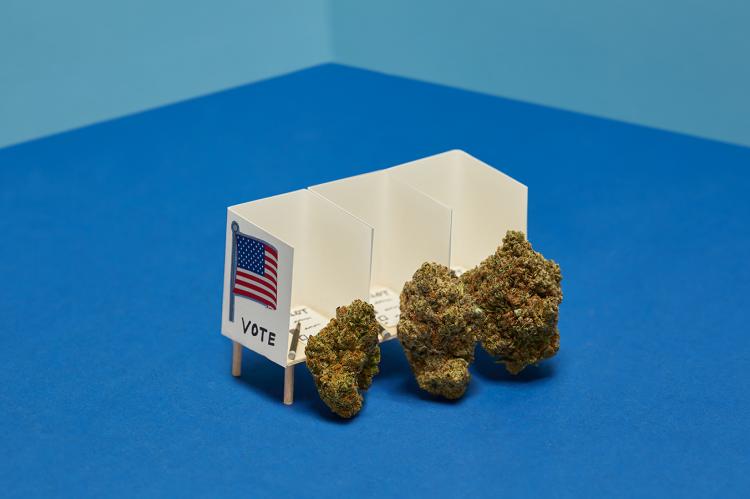2020 Ballot Results: Where is weed legal?
Back in August, I believed that 2020 could still be a big year for the cannabis legalization movement. Yesterday, voters finished casting votes in five states to determine whether or not to legalize cannabis use. Here are the results for Arizona, Mississippi, Montana, New Jersey, and South Dakota.
Arizona
Passed: Proposition 207, The Marijuana Legalization Initiative
Arizona Proposition 207, the Marijuana Legalization Initiative, has been approved by voters, according to several news sources.
This ballot measure legalizes the possession and use of cannabis for adults 21 and older, places a 16% excise tax on cannabis sales, and requires the Department of Health Services to develop rules to regulate commercial cannabis activity. Proposition 207 also includes provisions to establish a social equity ownership program to benefit communities disproportionately impacted by cannabis criminalization, as well as allow those with certain cannabis-related convictions to have their records expunged. The Department of Health Services will begin accepting early applications for marijuana establishment licenses beginning January 19th, 2021.
Mississippi
Voters in Mississippi had the option to vote between two competing medical cannabis legalization ballot measures. Initiative 65 was the result of a citizen-led petition, whereas Alternative 65A was placed on the ballot by the Mississippi Legislature. When a ballot measure is successfully filed in Mississippi, the legislature can either pass or reject the initiative with a majority vote or introduce an alternative ballot measure alongside the original initiative.
Passed: Initiative 65
Mississippi's Initiative 65 ballot measure has passed, according to several news sources.
Initiative 65 received majority approval over Alternative 65A, therefore Initaitive 65 will become law. Initiative 65 legalizes the use of cannabis as a medical treatment for 22 qualifying conditions, and patients will be allowed to possess up to 2.5 ounces of cannabis. The Mississippi Department of Health must adopt all rules and regulations for the medical program by July 1st, 2021 and begin issuing identification cards and treatment center licenses by August 15th, 2021.
Montana
Montana residents voted on two different cannabis-related ballot measures this year.
Passed: Montana CI-118, the Allow for a Legal Age for Marijuana Amendment
Montana CI-118, the Allow for a Legal Age for Marijuana Amendment, has been approved by voters, according to several news sources.
CI-118 amends the Montana Constitution to allow the legislature or a citizen initiative to set a minimum age for purchasing, consuming, and possessing cannabis. CI-118 adds two words to the Montana Constitution, underlined below:
“A person 18 years of age or older is an adult for all purposes, except that the legislature or the people by initiative may establish the legal age for purchasing, consuming, or possessing alcoholic beverages and marijuana.”
Passed: Montana I-190, the Marijuana Legalization Initiative
Montana I-190, the Marijuana Legalization Initiative, has been passed by voters, according to several news sources.
I-190 legalizes the possession and use of cannabis for adults 21 and older, places a 20% excise tax on cannabis sales, and allows for those with certain cannabis-related convictions to apply for resentencing or expungement. Montana residents will be allowed to possess, consume, and cultivate cannabis on January 1st, 2021. The Montana Department of Revenue will have regulatory authority over all commercial cannabis activity.
New Jersey
Disclosure: Weedmaps is part of a consortium that funds the NJ CAN 2020 campaign
Passed: New Jersey Public Question 1, The Marijuana Legalization Amendment
Public Question 1, the Marijuana Legalization Amendment, has been approved by voters, according to several news sources.
Public Question 1 will add an amendment to the New Jersey Constitution that legalizes the possession and use of cannabis for adults 21 and older. The Cannabis Regulatory Commission, originally tasked with overseeing the state's medical cannabis program, will have regulatory authority over the commercial cultivation, processing, and sale of adult-use cannabis. The constitutional amendment will take effect on January 1st, 2021.
South Dakota
South Dakota residents voted on two different cannabis legalization ballot measures this year- one initiative that would legalize cannabis for medical use and one initiative that would legalize cannabis for adults over 21.
Both ballot measures were approved by voters, making South Dakota the first state to legalize both medical and adult-use cannabis in the same year.
Passed: South Dakota Constitutional Amendment A, the Marijuana Legalization Initiative
South Dakota Constitutional Amendment A, the Marijuana Legalization Initiative, was approved by voters, according to several news sources.
Amendment A legalizes the possession and use of cannabis for adults 21 and older. Cannabis sales will be taxed at 15%, and the South Dakota Department of Revenue will have regulatory authority over all commercial cannabis activity. The measure will take effect on July 1st, 2021. The Department of Revenue must adopt all rules and regulations for the medical program by April 1, 2022. The amendment also requires the South Dakota State Legislature to pass laws to create a medical cannabis and hemp program by April 1, 2022.
Passed: South Dakota Initiated Measure 26, the Medical Marijuana Initiative
South Dakota Initiated Measure 26, the Medical Marijuana Initiative, was approved by voters, according to several news sources.
Initiated Measure 26 legalizes cannabis for medical use for those with debilitating medical conditions. The South Dakota Department of Health will have regulatory authority over the medical cannabis program and is required to adopt all rules and regulations no later than 120 days after the effective date of the initiative. The expected effective date of the measure is July 1st, 2021, therefore all rules must be adopted by October 29th, 2021. The Department of Health is also required to issue registry identification cards to qualified patients no later than 140 days after the effective date of the initiative.
- Log in to post comments

